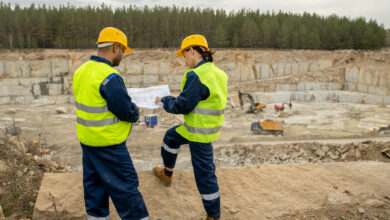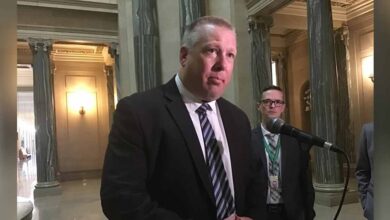
Why Has Alberta Paused New Wind and Solar Projects?
Alberta’s Premier, Danielle Smith, attributes the government’s halt on approving new wind and solar projects to Ottawa’s influence, asserting that federal policies hinder the creation of backup generation for renewable sources like natural gas.
Smith, who surprised the renewable energy sector with a six-month freeze on projects exceeding one megawatt, explained on a provincewide radio show that natural gas-powered backup plants are necessary for times when wind and solar power are unavailable due to weather conditions. She highlighted the paradox wherein the federal government opposes the inclusion of new natural gas electricity plants in Alberta’s grid.
She emphasized, “How can I expand wind and solar capacity if I can’t ensure power grid reliability through natural gas peaker plants? This is the crux of the issue. The federal government’s actions have introduced considerable uncertainty to the market.”
However, energy market experts, including economist Andrew Leach from the University of Alberta, found the rationale perplexing. He noted that Alberta’s market doesn’t mandate generators to provide constant power. For instance, adding solar energy to the grid doesn’t necessitate backup power generation, as it merely supplements electricity during sunny periods.
Leach suggested that the injection of affordable wind and solar energy might reduce the demand for natural gas projects, potentially lowering electricity prices. He also highlighted the reverse scenario, where fossil fuel ventures could deter green energy initiatives. He underlined that Alberta’s energy market operates based on free and open competition, as mandated by law.
Vittoria Bellissimo, representing the Canadian Renewable Energy Association, recommended addressing hindrances to energy storage projects, such as tariffs treating storage providers as consumers or generators, as well as forcing them to purchase energy when they’re primarily storing it. This approach could allow storing excess energy from solar and wind sources for later use.
Bellissimo contradicted the notion that natural gas is indispensable for the system’s functionality, suggesting that various resources capable of time-shifting could serve the purpose.
The government’s announcement of the project freeze was accompanied by a statement outlining an inquiry by the Alberta Utilities Commission into matters like development impact on agricultural land, scenic effects, reclamation assurances, municipal roles, and system reliability.
Alberta has taken a leading role in renewable energy within Canada, exceeding its goal with 17% of power sourced from wind and solar in 2022.
Nathan Neudorf, the minister of affordability and utilities, acknowledged the short-term inconvenience of the moratorium but believed it was crucial for long-term success.
The Rural Municipalities Alberta representative expressed concerns about potential environmental cleanup issues and the displacement of agriculture due to renewable energy ventures, similar to problems experienced with abandoned oil and gas wells.
Despite these concerns, the move was made without industry consultation due to scheduling constraints.








































